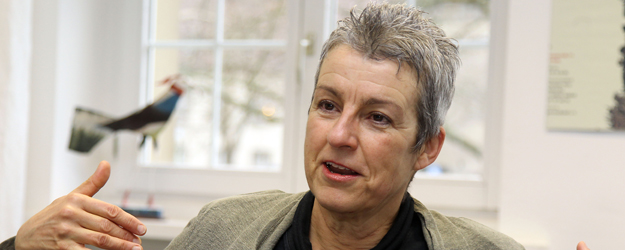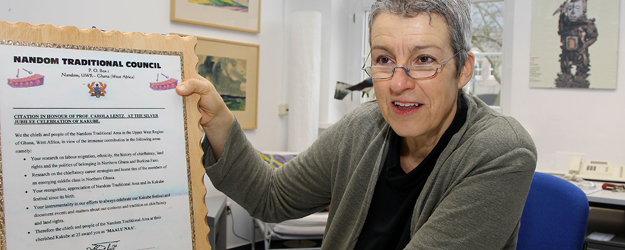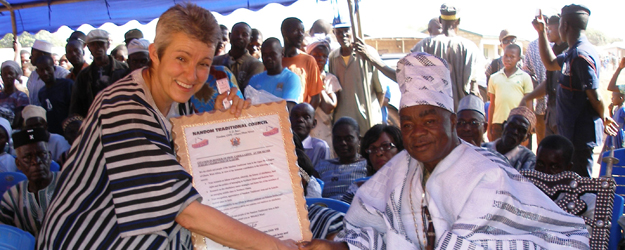13 March 2014
It was the first time that the title of "maalu naa" had been awarded in Nandom, in Ghana's Upper West Region – and it was bestowed on Professor Carola Lentz from the Department of Anthropology and African Studies at Johannes Gutenberg University Mainz (JGU). The title makes her a kind of chief, or, to be more precise, a "development chief" of a district that encompasses some 100 settlements with around 50,000 inhabitants.
Her office on the Gutenberg Campus has a tidy but low-key appearance. Gray ring binders with neat titles line the bookcases. No question that this is a well-organized workspace. And yet the room gives off a distinct Ghanaian impression. A painting shows figures of market-women in bright garments, and diagonally opposite it hangs that special certificate which declares Carola Lentz to be a "maalu naa."
"'Maalu' means 'to do it well'", the anthropologist explains. "So, if you will, it makes me a chief who does it well, who makes things happen." In December 2013, as part of the big Kakube cultural festival, Lentz was awarded the title by Nandom Naa Dr. Charles Puoure Puobe Chiir VII., the Paramount Chief of the Nandom Traditional Area in Northern Ghana. Lentz, however, has to go back a little further in order to explain what this title really means for her. Because "chief who makes it happen" does not really describe the role the professor plays.
Audience with the Paramount Chief
"You will often find with anthropologists that their life story is closely interconnected with the research they are doing", Lentz explains. At any rate, it certainly is in her case. "In 1989, soon after receiving my doctorate, I went to Nandom with a group of thirteen students. And of course, it was only polite and proper that we went to pay our respects to the chief."
This chief, the Paramount Chief, had just taken up office, but his position was by no means secure. "A year before there had even been a small armed uprising against the chief."
Charles Puoure Puobe Chiir VII. gave the young woman from Germany and her students an audience right at the time when he stood to profit most from the gesture. "The Paramount Chief of Nandom is highly educated. He had studied economics in Italy. I found him to be a bit of a showman as well as being a charismatic politician. He summoned us to greet him on exactly the morning that the Kakube Festival was to be celebrated for the first time. The festival is a kind of harvest thanksgiving with dance competitions and political speeches."
Bitterness is sweet
The chief made the Germans part of his entourage and together they marched to the festival ground. This added to the chief’s prestige. "At the time, of course, I didn’t understand all the implications because I did not know much about the succession conflict", Lentz recalls.
But that was to change. Soon she felt genuinely accepted, not only at the festival but also among the people in the Nandom region. She was received into a family of the Dagara people and was given the name "Tuonianuo," "Bitterness is sweet."
Anselmy Bemile, the family patriarch, taught Lentz the "Dagara way of life": For him, there was no contradiction between the modern world and local traditions, between Christianity and the wisdom of ancestors. Rather they all belong to one single world. "This mentality is typical for Ghanaians."
Colonial rulers and chiefs
Lentz did research on the role the chiefs had played in the region. Among the Dagara, the office in its current form was essentially first established by the British in colonial times. "In precolonial West Africa, there were states with kings, hierarchies, and even small bureaucracies. But there were also societies like those in northwestern Ghana which were not centralized, but held together by kinship and local cults for the earth god." They too had their prominent figures, the "strongmen." They, however, did not have an inherent claim to leadership and did not hold hereditary office.
The British, as colonial rulers, were not interested in such niceties. They were looking for genuine personalities who could be used as middlemen. And when they found them they established them as chiefs. This then led to a uniform administrative system.
After independence in 1957, the Ghanaians took over this system of chiefs as a means of maintaining local culture, and the chiefs continued to act as middlemen between the government and the village population. In Nandom, the chiefs basically re-wrote history in order to legitimize their position. As they saw it, the tradition of the chiefs reached back to precolonial times. Lentz wrote about this and her findings were not always well received.
Seven men, one woman
Lentz has done research on various topics such as labor migration and land rights or the emergence of an educated middle class and the special role of northern Ghana, which the rest of the country sees as backward. Time and again she brought her students with her. Two books and numerous articles were published. The Mainz anthropologist is an expert with deep knowledge of this culture.
And that is why Charles Puoure Puobe Chiir VII. made Lentz "maalu naa." Eight people were honored at the Kakube Festival in 2013. Among them was Dr. John Atta Mills, the deceased President of Ghana, and the deceased Archbishop Cardinal Peter Porekuu Dery. "The Paramount Chief showed once again what a clever tactician he was at the award ceremony. He honored four Ghanaians and four Europeans. But I was the only woman," Lentz explains.
Charles Puoure Puobe Chiir VII. is now held in high regard. "He was Vice-President of the National House of Chiefs, a post no Northern Ghanaian had ever held." Lentz pauses for a moment, then adds: "He is an extraordinary person. He has made a great impression on me."
Thanks for the commitment
However, Lentz had always endeavored to be neutral. She never let any party influence her and even had to put up with hostility from some chiefs. "I think my books give a balanced view," Lentz states laconically.
Her new title "maalu naa" is not hereditary and it is not bound to any duties. It is intended as a big thank you for her commitment over the years – even if her presence was not always quite as beneficial for the Paramount Chief as was the case at the Kakube Festival 1989.



